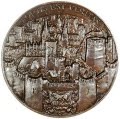A Mars a Day
The theme of the meeting today was Mars, which is suitable
for the month which is named after the Roman God. Many of us of a certain age
in England associate the word with the delicious chocolate bars. It was first
manufactured in 1932 in Slough. It is not named after the planet or the god but
a man called Forrest Mars, Sr.
The advertising jingle, “A Mars a day helps you work, rest
and play" jingle was associated with the confectionary from the late 1950s
through to the mid-1990s. It was reintroduced a few years ago.During the
football World Cup in 2006 Mars rebranded its bars with the word
"Believe" in support of the England team.
The god Mars features on many ancient coins. In ancient
Roman religion and mythology, Mars was the god of war and also an agricultural
guardian, a combination characteristic of early Rome. He is the son of Jupiter
and Juno, and was pre-eminent among the Roman army's military gods. Most of his
festivals were held in March and in October, the months which traditionally
began and ended the season for both military campaigning and farming.
The union of Venus and Mars held greater appeal for poets
and philosophers, and the couple were a frequent subject of art. The wild
animals most sacred to Mars were the woodpecker and the wolf, which in the
natural lore of the Romans were said always to inhabit the same foothills and
woodlands. A stylised "spear and shield of Mars" is also the symbol
for the planet Mars and male gender.
